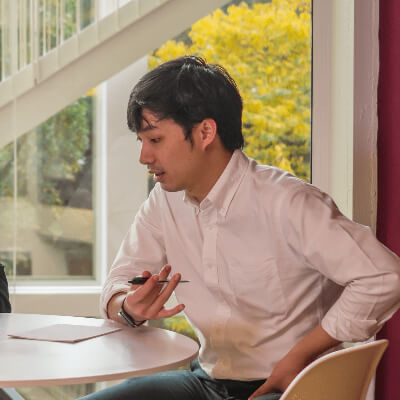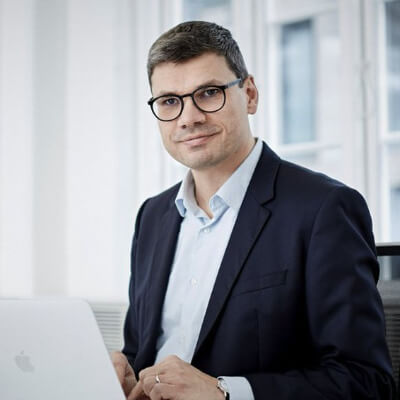There must be something in the Scandinavian water, because not only is it home to the world’s happiest people—according to a 2023 US News and the World survey—the region also lays claim to three of the planet’s five greenest countries.
But what is it that Scandinavia (comprised of Norway, Sweden, and Denmark) are doing differently? 
It’s a question that Thai accounting graduate, Nontawach (Ta) Soonthornsorn (pictured right), was determined to find out.
After spending five years working for the top accounting and professional services firm PwC in Bangkok, his interests increasingly grew in the area of sustainability. But he was disappointed by the avenues open to him in his homeland.
“The sustainability practice in Thailand is still very immature,” he says.
As a result he began to look for opportunities to study further afield—a search that ultimately brought him to the one-year Copenhagen Business School MBA.
Not only is it the only full-time MBA program in Scandinavia, which appealed to him due to its high standard of living, it also offers a top-notch specialization in sustainability.
“I saw that CBS has sustainability integrated into its MBAs. That sounds interesting to me,” he says.
Now, having moved on from PwC and working as a sustainability analyst for Raison Consulting, it’s clear that the MBA in Copenhagen taught Ta the necessary skills to pivot his career. The question is: how?
How an MBA helped pivot my career from PwC to sustainability consulting
I experienced a democratic teaching style
One element of the Copenhagen MBA that really stood out to Ta was the egalitarian style of teaching.
In each of the program’s core modules—which include analytics, accounting, and innovation management—students are encouraged to discuss their ideas with each other, rather than simply engaging in coursework on their own.
“It's not competitive, it’s more collaborative. People just like helping each other,” Ta says.
Another aspect of the teaching that Ta felt he benefitted from was the non-hierarchical relationship between professors and students. 
In class, CBS professors interact with students on a one-to-one level, asking them to explain and support their ideas, helping to develop both their communication and critical thinking skills.
Andreas Rasche (pictured right), Professor of Business in Society at the CBS Centre for Sustainability and Associate Dean for the CBS full-time MBA program, explains, “The Scandinavian method of teaching is always that the students need to find their own way.”
I learned from world-leading sustainability researchers
Though CBS’ sustainability ethos is woven through the entire MBA, in their third semester, students have the opportunity to specialize in the Governance and Sustainability track.
Students who pick the specialization study a range of topical modules including Leadership and Corporate Governance, Circular Economy and Sustainable Supply Chains, and Sustainable Finance.
One of the main takeaways from these modules is the practical implementation of ideas, rather than just learning about theory.
“You really need to make changes to processes, products, and services in order to create the impact that we all want,” Andreas says.
Helping students explore more ways in which sustainable practices can be established, the CBS campus also features the cutting-edge Centre for Sustainability—the first of its kind in Europe.
There, leading researchers work on numerous projects surrounding pressing environmental issues such as supply chain and sustainable consumption.
“We always try to be on the edge of research,” Andreas adds.
They also research and develop methods of sustainable entrepreneurship, which are then brought into the classroom to help support students considering launching their own projects in the field.
I immersed myself in a green campus
There’s no better way to get to grips with sustainability than immersing yourself in a culture that lives and breathes it.
Considered the green capital of the world, Copenhagen boasts a total of 546 km of bicycle paths, while also holding plans to become completely carbon neutral by 2025.
Ta saw the benefits of Denmark’s green transport initiatives most acutely in the short travel time it took to get to different places.
“There’s almost no traffic at all,” he says.
Plus, like the city around it, CBS’ campus is also dedicated towards environmentally friendly practices, such as encouraging cycling, cutting down on waste, and promoting student initiatives, which even includes planting rooftop gardens.
I accessed a sustainability-focused job market
Given its status as a cleantech hotspot, Denmark possesses an exciting number of career opportunities for graduates interested in sustainability.
At the end of Ta’s fourth term, the CBS careers team supported him in landing an internship at Raison Consulting, a specialized sustainability and ESG strategy consultancy firm.
After completing the internship he accepted the offer of a full-time role.
Now almost a year into his time with the firm, Ta says he has been impressed with the amount of trust placed in him by the company.
“Here, trust is something you risk losing. Even being super new in the company, I am required to work independently a lot,” he says.
In his day-to-day role, he spends his time helping clients to increase the sustainability of their businesses while also reaching out to potential new clients—utilizing key soft skills developed on the MBA.
“It’s the nature of the MBA that you need to talk to a lot of people at a lot of networking events. I learned people skills,” he says.
Ta admits that changing from accounting and finance to sustainability was definitely a nerve-wracking jump, but he feels the skills he learned on the MBA helped him to feel more secure in his decision.
“It opens the way for you,” he says.




